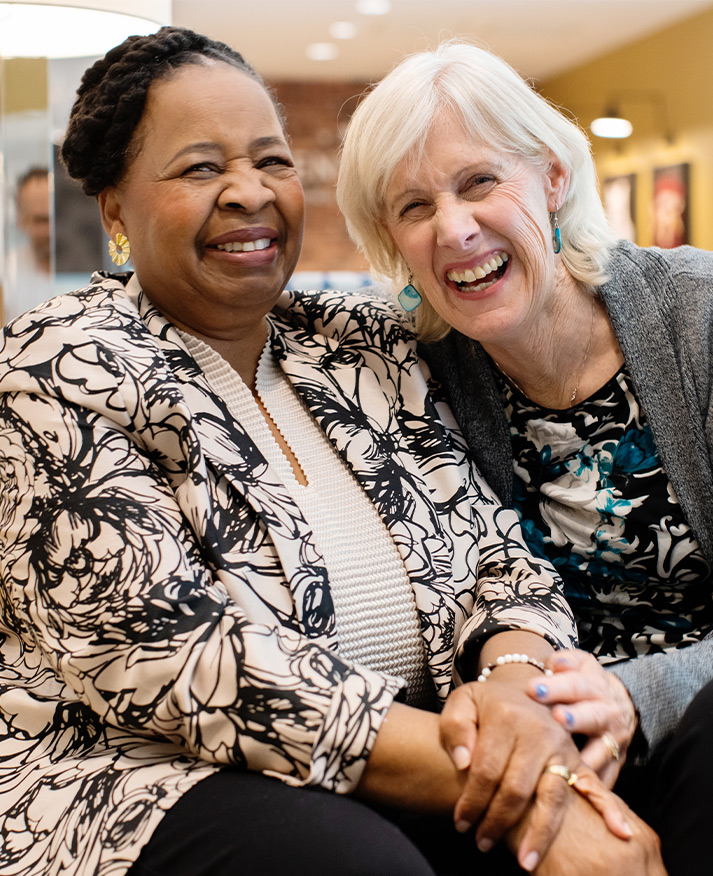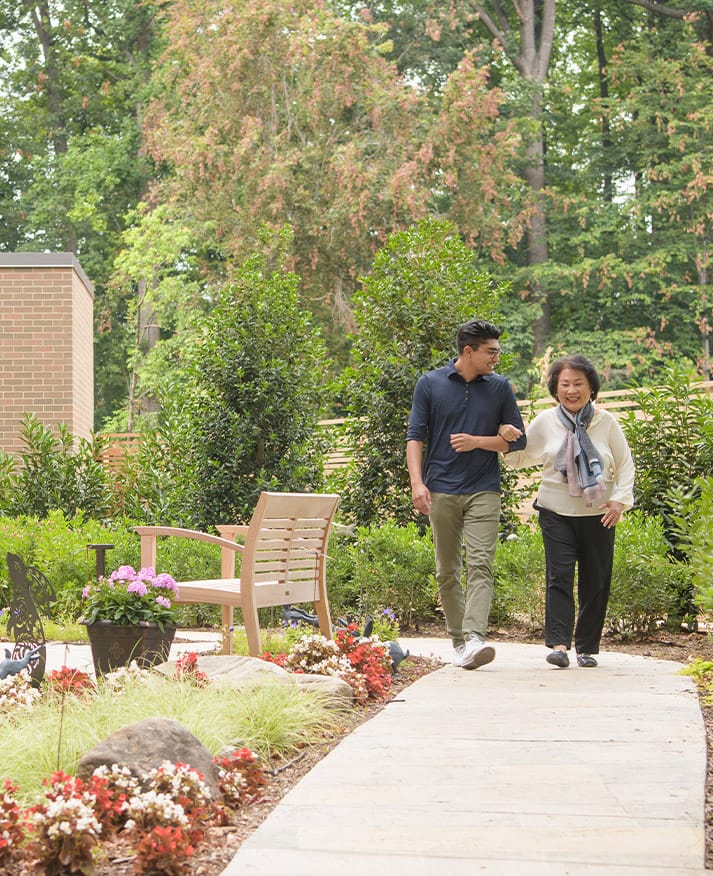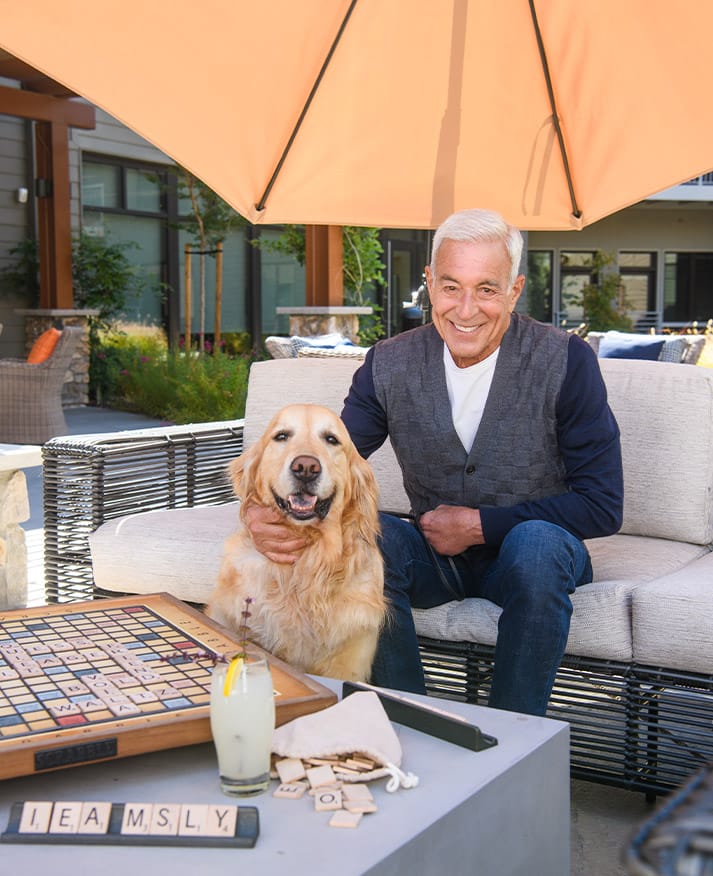How LGBTQ+ Pioneers Continue To Inspire Change
“I came guarded when I came here with all my experiences,” Andrés reflected as he shared his early memories of moving into a Watermark community just two years ago. He continued with a hearty chuckle, “And then the drag queens came in. Oh my God! THE DRAG QUEENS CAME IN!” Seated in the front row, draped in a rainbow feather boa, and a smile from ear-to-ear during the community’s first-ever drag show, Andrés began to feel like it was safe to let his walls down.
In a world where acceptance should be the norm, the reality for many LGBTQ+ seniors like Andrés paints a stark picture of the challenges they face. Andrés, who bravely came out in his fifties, found himself feeling forced back into the shadows when he began exploring senior living communities. His experience underscores the harsh reality faced by many; one-third of LGBTQ+ older adults fear having to re-closet themselves when seeking senior housing due to fear of judgment and discrimination. However, amid these challenges, Andrés’ narrative took a profound turn when his retirement community extended an invitation to Pride Month programming — an act that not only invited acceptance but also ignited a newfound sense of belonging and authenticity.
Born in Cuba in 1943, Andrés moved to New York, where he met his wife and had two children. He shared how coming to terms with his identity later in life had a drastic impact on his emotional well-being. "Adversity came late to me. I did not express my sense of adversity during my marriage, but that decision presented stressful elements to my life." Andrés expressed deep gratitude for his wife’s compassion and understanding, sharing how they remained close friends after their divorce — but the process leading up to it wasn’t easy. “The thought of doing anything that would harm her was really, really strong, but at the same time, the thought of me not being who I was was even worse.”
Andrés began living life as an openly gay man in his fifties. He moved to Rochester and became involved with local LGBTQ+ organizations, finding support among peers and forming new friendships. “The gay community became my home and became my family,” he shared. These newfound connections influenced significant improvements with his mental health, as Andrés recalled how feelings of stress and thoughts of self-harm receded the more he embraced this new chapter of his life.
.jpg)
Two decades later, those feelings of fear resurfaced when faced with moving into a new and unfamiliar environment — a retirement community. Legacy at Clover Blossom’s robust selection of Pride Month programs played a critical role in his second coming out journey. “I’ve done it so slowly. By and large, there’s support here. And I see a lot of people here that wear items of dress that say ‘you’re one of me,’” he said, referring to symbolic accessories like rainbow jewelry, pins, and flags. Andrés conveyed how those symbols have helped him determine if someone is an ally, and how it makes him more comfortable to strike up a conversation about shared interests.
The community’s Sales Director, Michaela Bleier, went on to share how inspiring it has been to see the lasting impact of their Pride Month programs. “We handed out little rainbow flags and a lot of residents decided to take them and put them in their walkers. There's a solid handful of residents that still have them taped to their walkers from last year and it's their way to say, ‘Hey, I'm an ally and you can talk to me.’”

With nearly 60% of LGBTQ+ older adults reporting feeling a lack of companionship and more than 50% feeling isolated from others, visual expressions of support and solidarity create spaces where everyone feels safe to be their authentic selves. Michaela continued, “You walk in the front doors, and there's the rainbow heart sticker on the glass that says, 'You are welcome.' And these symbols that we look for make it okay to have the conversation without having to feel like we're dancing around the topic.”
As for Andrés, finding the courage to embrace his true self once again has provided a fresh lease on life in his retirement years. With an expanded group of friends and newfound zest for life, he is not only thriving, but his story serves as a beacon of resilience and inspiration to others. When he’s not singing his heart out at karaoke or socializing with his new friends over a cup of coffee, Andrés has been spending his free time reigniting the joy of a lifelong passion — theater arts. He has been hard at work writing a two-act play about the Stonewall Uprising, a historical event that had a significant impact on his personal journey and also marked a turning point in the fight for LGBTQ+ rights.
The Legacy of a Senior-Led Movement
LGBTQ+ seniors are brave pioneers who stood up and pushed back, refusing to be treated as social outcasts, criminals and sinners, or seen as mentally ill. Their living legacy includes hard-won federal rights for LGBTQ+ members to legally marry, adopt, work, and seek housing and health care without discrimination. Not Another Second — Watermark’s interactive national cultural awareness exhibition developed in partnership with SAGE — tells the untold stories of 12 LGBTQ+ elders, acknowledges their sacrifices and contributions, and celebrates their bravery.
In 2021, the Not Another Second exhibit debuted at a Watermark community in New York, garnering outstanding reviews and international media coverage with stories featured in The New York Times, The Guardian, NBC News, Advocate, The New Yorker, Travel + Leisure, Cool Hunting, and more. The exhibit also earned a nomination for Best Cause Related Campaign in the 2021 Webby Awards and received further media coverage in Beverly Press, LA Spectrum News, and GENLUX magazine following its sophomore run at a Watermark community in California.
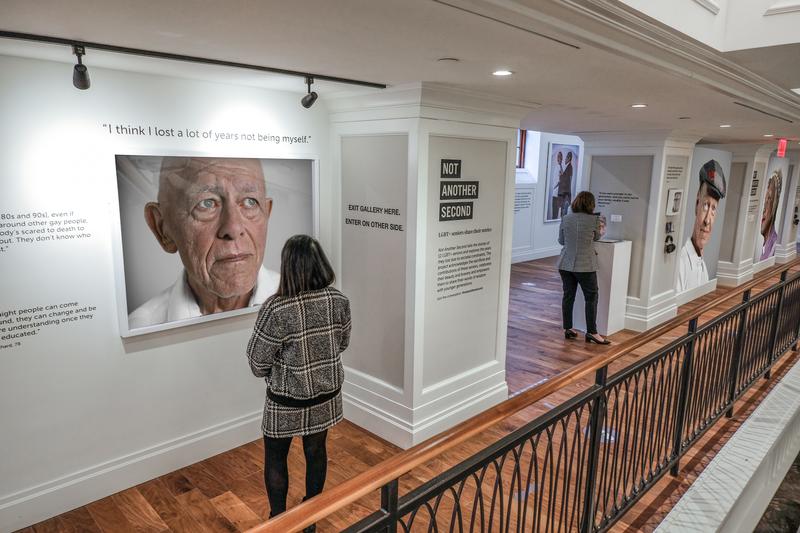
The Not Another Second documentary has been viewed over 40,000 times on YouTube alone, and a portion of the sales proceeds from the Not Another Second book were donated to The Trevor Project in 2023, helping to raise awareness and bridge the gap between generations by offering a message of hope and solidarity to all ages.
Reverend Goddess Magora Kennedy was one of the remarkable seniors featured in Not Another Second whose memory lives on through the lives she touched as a lifelong community activist and ordained minister. Reverend Kennedy took part in countless marches for civil rights, women's rights, and LGBTQ+ rights in her 85-year journey to create lasting change. As a member of the Black Panther Party and participant of the Stonewall Uprising, her extensive work in civil rights continues to inspire younger generations.

"Being lesbian, and black, and in a church, it was difficult. But I stood my ground, and I refused to let people intimidate me. I believe that made me even stronger by the time 1969 rolled around,” she reflected.
Reverend Goddess Magora Kennedy
Photo by Karsten Thormaehlen
By the time 1969 did roll around, Reverend Kennedy was 31 years old. Social change was afoot on all fronts — civil rights, anti-war, and women's rights movements were all taking off. The continuous harassment and discrimination inflicted throughout a series of police raids targeting LGBTQ+ establishments in New York City culminated in a pivotal moment of resistance and protest.
When the uprising broke out during the early hours of June 28 after police officers raided the Stonewall Inn, Reverend Kennedy and her friends heard the news on the car radio. She turned her car around and headed straight back to Greenwich Village to protest, refusing to back down in the face of the brutality she witnessed that morning. "Everybody said, ‘enough was enough’ and they weren't taking it anymore. We didn't know it then, but that was the beginning of the gay rights movement.”
The six consecutive days of protests that followed came to be known as the Stonewall Uprising. Emboldened by outrage over police brutality, the public came together in an unprecedented showing of support for gay rights. It was the beginning of big changes to come.
Reverend Kennedy recalled the very first Pride March organized by Jim Owles in 1970. Starting in Greenwich Village, they left Washington Square Park and made their way uptown where they were met with violence.
"Everything was OK until we got uptown to St. Patrick's Cathedral. When we got to St. Patrick's Cathedral that June in 1970, they poured out of the church. They threw garbage at us. They called us all kinds of names. They did everything. We left the village with 200 people, and by the time we got to the Sheep Meadow, it was about 50 of us. But we locked arms and we kept going."
Reverend Kennedy detailed how the years that followed were not easy, but people stayed strong and kept fighting to advocate for change. “And then the next year the march started getting bigger. People began to feel more comfortable about being gay, and being open about it. So by 1975, Sunday, the Gay Pride Parade, people had come from the whole tri-state area. By 1980, people were coming from all around the country. And on up. And people began to really take on being who they were in the workplace. And in the homes, in the schools."
Thanks to the fortitude of Stonewall veterans like Reverend Kennedy, Pride Month is now openly celebrated by millions in New York City and other cities around the world. In 2019, 50 years after the Stonewall Uprising, Reverend Goddess Magora Kennedy was honored for her participation in the historic event. The New York City Police Department also issued a formal apology for the first time, acknowledging that the laws and their behavior enforcing them in 1969 were discriminatory. That same year, Reverend Kennedy was appointed to the first LGBTQ+ Committee of the National Action Network, which she had been a founding member of 25 years earlier. After her passing in November 2023, internationally renowned civil rights leader and founder and president of the National Action Network, Reverend Al Sharpton, delivered her eulogy and paid tribute to her legacy.
Reverend Kennedy’s extensive work in civil rights continues to inspire many, and also reminds us there is still work to be done. "Being gay, and being a lesbian, and being involved in things like the civil rights movement and now the struggle with gay rights, and being a senior, it has been quite a learning experience and I am so happy to see how far we've come, but we still have a long way to go.”
The Ongoing Fight for Equality
Echoing Reverend Kennedy’s sentiment, Watermark recognizes the significant ongoing work required to advance progress.
A study conducted in 2022 by AARP revealed that a vast majority (85%) of older LGBTQ+ individuals are concerned about discrimination based on sexual orientation and worry about how they will care for themselves and others.
LGBTQ+ seniors face many challenges and barriers when finding welcoming and inclusive places to live and receive care, highlighting the urgent need for senior living communities to create safer spaces for LGBTQ+ residents.
With the population of LGBTQ+ individuals over 50 projected to reach 7 million by 2030, tools like the Long Term Care Equality Index (LEI) have become critical in ensuring that long-term care communities are safe, welcoming, and inclusive to all residents. Created by the Human Rights Campaign Foundation’s Health & Aging program and SAGE, the LEI is instrumental in promoting LGBTQ+ inclusive policies and practices in residential long-term care and provides senior living communities with resources and technical assistance to strengthen and innovate their inclusion efforts.
.jpg)


The 2023 LEI report recognized 57 Watermark communities as High Performers among 200 participants nationwide. Working in partnership with SAGE and its SAGECare cultural competency training program since 2017, Watermark has engaged associates of more than 65 retirement communities in LGBTQ+ competency training in order to recognize and meet the needs of this segment of the aging population, as well as to provide living and working environments free from discrimination.
“Watermark Retirement Communities is a recognized national leader in LGBTQ+ inclusivity and serves as an example to other organizations,” said Sherrill Wayland, SAGE’s Senior Director of Special Initiatives and Partnerships.
Our efforts to create inclusive communities go much deeper than simply providing sensitivity training to associates. Over the past several years, we’ve examined existing policies, procedures, and handbooks in order to make revisions necessary for inclusion. One notable update identifies friends of LGBTQ+ residents as primary caregivers, a policy that doesn’t exist in many other care settings. Furthermore, SAGECare has also led Watermark to be a more inclusive employer, implementing policies that address issues for associates in same-sex marriages or who are transgender. The Human Rights Campaign Leadership Equality Index even requested to use Watermark’s Transgender Inclusive Workplace policy in their resource toolkit as a great example for company policy. These changes go beyond just recognition and acceptance, as they ultimately strengthen our ability to care for the growing population and foster diversity of thought, experiences, and perspectives within the workforce.
Lighting the Path Forward
The fear of coming out can be a deeply personal and challenging experience for individuals grappling with their identity. The bravery displayed when embracing one’s true self serves as a guiding light that illuminates the paths of those still navigating the shadows of self-discovery and acceptance.
In the wake of Not Another Second’s 2021 debut, one of Watermark’s National Directors came out as transgender and announced their intent to transition. The news of their journey was celebrated with overwhelming support from within the company — including some more inclusive policy changes — however, the most heartwarming part of this story happened behind the scenes. Several associates from around the country sent quiet notes of gratitude with a common theme that although they weren’t ready to step forward, the fact that this person had done so had given them hope. Hope that they could be less fearful and perhaps just as well-received and loved as this associate. For those who follow in this associate’s footsteps, that could be the most powerful legacy of them all.
While the fear of coming out encompasses fear of rejection, discrimination, and the uncertainty of how others will respond, the courage and resilience displayed by those who embark on this journey can serve as a beacon of hope for many who share similar struggles.
At the time of her Not Another Second interview, Reverend Kennedy had been out and proud for more than 50 years and still knew people her age who were in the closet. "I talk with them and tell them that eventually, it's better to be free. But everybody has to arrive at that at their own level, and where they feel comfortable."
"There are some people that will never ever come out the closet. There's some people so far in the closet you have to shine the light to find them. But the thing is, the best thing to do is to be true to yourself," said Reverend Kennedy. "Be true to yourself and don't let anybody dissuade you from your dream. You know who you are. The best thing to do is to be yourself, and don't let nobody turn you around."
The Impact of Inclusive Programming
Implementing LGBTQ+ programs not only fosters a sense of belonging and acceptance among residents and associates, but also cultivates a supportive environment for families, friends, and community visitors.
Michaela Bleier recalls what inspired her to introduce inclusive programming. As members of the LGBTQ+ community themselves, Michaela and her fellow colleague noticed there was a lot of negativity and unknowns surrounding the topic. They thought that if they could share information in a conversational way, residents might be interested in learning more.
Legacy at Clover Blossom hosted their first-ever Pride series in June of 2022, and seven residents attended the first educational session. In 2023, they enhanced the Pride series by bringing in esteemed guest speakers to present on more LGBTQ+ topics, including classes titled, LGBTQ+ Trailblazers, Coming Out as LGBTQ+: What Allies Need to Know, Navigating Pronouns and LGBTQ+ Conversations & Thoughts, and LGBTQ+ Cross-Generational Evolution. The community was delighted with the positive response, welcoming more than 40 attendees for each topic.
"The main reason we turned this into an annual event is because of the positive impact it has had on our residents, families, and associates’ lives," Michaela explained. "If we can spark a conversation or a change in one person’s mind, then we are making a difference.
Our guest speakers have answered questions from the residents like, 'How do I ask my granddaughter about the girl she is dating?' all the way to, 'My grandchild is transgender, and I want to know if I can have photos of them as a baby boy even though they are now identifying as female … will seeing their old baby pictures upset them?'”
In addition to the resounding success they experienced with the second annual Pride series, the community hosted a plethora of other interactive, intergenerational events in celebration of Pride Month. From making tie-dye pride shirts and crafting themed decorations bursting with color, to participating in the Rochester Pride Parade and hosting the community's first-ever drag show, their programs brought joy to many, garnered an abundance of support, and raised awareness to an important cause.
June, a resident of Legacy at Clover Blossom, has several LGBTQ+ family members. Her journey toward being a vocal ally highlights how these inclusive learning experiences not only educate and empower residents, but also strengthen bonds with their families. "My daughter, Jen, came out to my husband and me as lesbian about 30 years ago. It wasn’t hard for us to accept. She is still my little girl, she didn’t change, she’s still the same,” she shared. "We now participate in Pride activities together. Last year, my daughter and her wife, Molly, came out and marched with us in the Pride parade and helped us decorate the bus!"
.jpg)
Michaela with her mom and grandmother
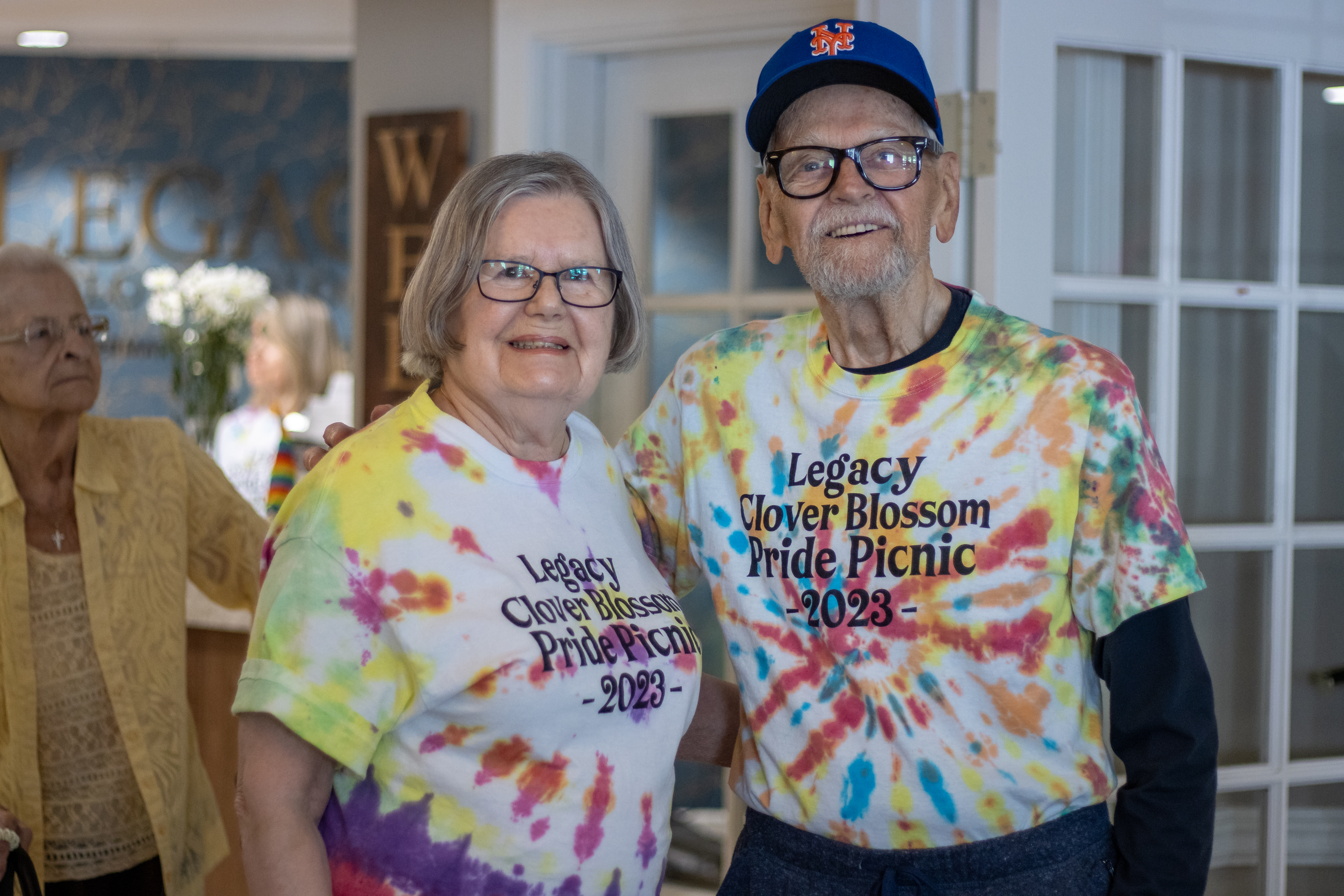
June and Arnold
June also participated in the community’s guest speaker series, and went on to share how the classes helped her gain a better understanding when it comes to terminology like pronouns. As one of several residents with a grandchild who identifies as transgender, June says that attending these sessions has led to building a supportive network of love and understanding. “We don’t know what gay and trans kids go through. We can’t feel how it is to be born in the wrong body and how hard that can be on you,” she said.
Accompanying her to every Pride Month event was June’s husband, Arnold. Married for more than six decades and now in their eighties, the couple remain steadfast allies of the LGBTQ+ community, and their unconditional support has inspired empathy and acceptance among peers. “I don’t know if we can ever really change the minds of people, but we should all strive to be more accepting,” shared June.
Through these heartfelt narratives from Legacy at Clover Blossom, we see how inclusive programming serves as a catalyst for meaningful dialogue, fosters connections that transcend barriers, and creates environments where everyone feels seen, heard, and valued.
How To Activate Your Own Community
Did you know that the percentage of LGBTQ+ adults in the United States has doubled over the past decade? A 2022 study conducted by Gallup predicts the proportion of adults who identify as LGBTQ+ will exceed 10% in the near future.
Chances are, you probably know someone who is a member of the LGBTQ+ community. Watermark's National Director of Business Office Functions Jeff Jarnigan shed insight that directly supports this statistic. "In SAGECare trainings, I always poll participants early in conversation to identify those that know someone who is a member of the LBGTQ+ community,” he said. “There has never been a single instance of all the trainings I’ve led where someone didn’t know, work with, or had residents living in their community that are LBGTQ+."
According to the 2023 LEI Report, 76% of LGBTQ+ older people are concerned about having adequate social supports to rely on as they age, and 73% do not have access to LGBTQ+ specific services for older people. This underscores the importance of senior living communities creating a supportive and welcoming environment for residents.
So how does one begin to implement such programs? Communities can start by creating safe spaces for LGBTQ+ residents to socialize and express themselves freely, organizing events and programs that celebrate LGBTQ+ history and culture, and connecting residents with local LGBTQ-friendly organizations. "Residents, associates, and guests who are part of this community or allies of the same will recognize these efforts, and should it ruffle feathers, it creates a space for dialogue and understanding,” Jeff shared.
Last year, Jeff developed Watermark’s Community Resource Guide for LGBTQ+ Residents, Associates, and Visitors. The customizable guide includes local LGBTQ-friendly organizations, places of worship, businesses, and outings, along with movies, television shows, and books that highlight the LGBTQ+ community, and more. This guide can be adopted and customized for any community, and is a valuable tool in connecting LGBTQ+ members and allies with relevant interests.
Strength in Unity
From the historic milestones that mark the path to equality to the ongoing advocacy efforts that shape our collective future, the LGBTQ+ community has carved out spaces of acceptance, affirmation, and celebration. “From an altruistic perspective, I hope people understand that many of the freedoms and liberties we enjoy today were made possible by people who suffered and persevered and paved a new path before us,” says David Freshwater, chairman of Watermark Retirement Communities.
While LGBTQ+ seniors continue to pioneer change, their voices are amplified through associates, families, and friends, further advancing progress. Through this intergenerational collaboration, we witness not only the celebration of identities but also the nurturing of understanding, empathy, and unity across diverse communities.
Watermark is proud to be at the forefront of the national LGBTQ+ elder inclusion and equity movement. Our unwavering commitment to fostering inclusivity aims to ensure that LGBTQ+ older adults can age with the dignity and respect they rightfully deserve. As the first senior living provider nationwide to pursue SAGECare Platinum credentials for all of our communities, we’re dedicated to creating inclusive environments that encourage everyone to thrive and find joy and personal fulfillment, regardless of sexual orientation or gender identity.
If you or a loved one are looking for an inclusive senior living community, check out this Finding an LGBTQ+ Inclusive Long-Term Care Community guide or click here to find a SAGECare credentialed service provider.
Looking for more ways to get involved? Check out these resources!
- SAGE is the country’s largest and oldest organization dedicated to improving the lives of LGBTQ+ older people. Founded in 1978 and headquartered in New York City, SAGE offers supportive services and consumer resources to LGBTQ+ older people and their caregivers. Discover ways to get involved here, or download their Welcome to Pride Guide for tips and ideas on making Pride age-inclusive.
- The National Resource Center on LGBTQ+ Aging created Inclusive Services for LGBTQ+ Older Adults: A Practical Guide to Creating Welcoming Agencies, a free 28-page guide to help service providers understand the unique barriers that LGBTQ+ older adults face, as well as the many ways to improve and expand the continuum of care and services available.
- PFLAG is the nation's largest organization dedicated to supporting, educating, and advocating for LGBTQ+ people and those who love them. PFLAG provides free resources and has support chapters across the country. Find your local PFLAG chapter here or join a virtual meeting.
- CenterLink is an international nonprofit organization and member-based association of LGBTQ+ centers and other LGBTQ+ organizations serving their local and regional communities with the mission to strengthen, support, and connect LGBTQ+ community centers. Explore their LGBTQ+ Center Directory to find a location near you.
- HearMe, an LGBTQ+ founded company, is an on-demand mental wellness app that connects people with shared lived experiences for emotional and mental well-being. In partnership with SAGE, HearMe offers exclusive, round-the-clock access to culturally competent, empathetic LGBTQ+ and allied listeners who are trained in LGBTQ+ aging issues in order to provide you with the support, understanding, and connection you deserve.
.jpg)
